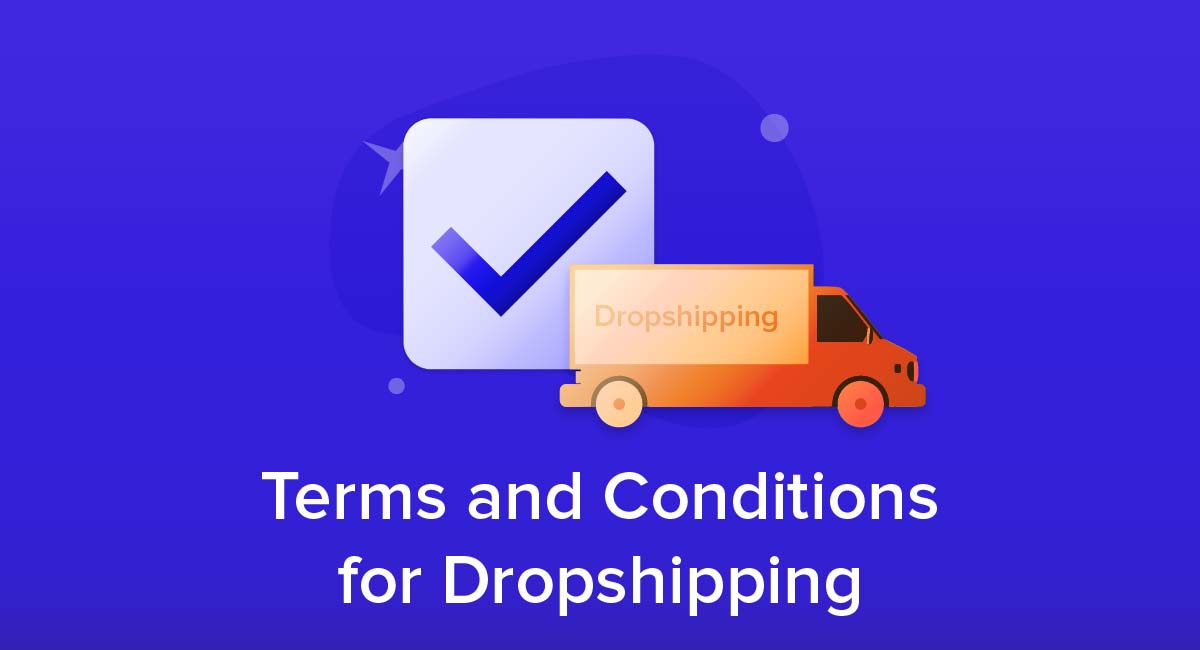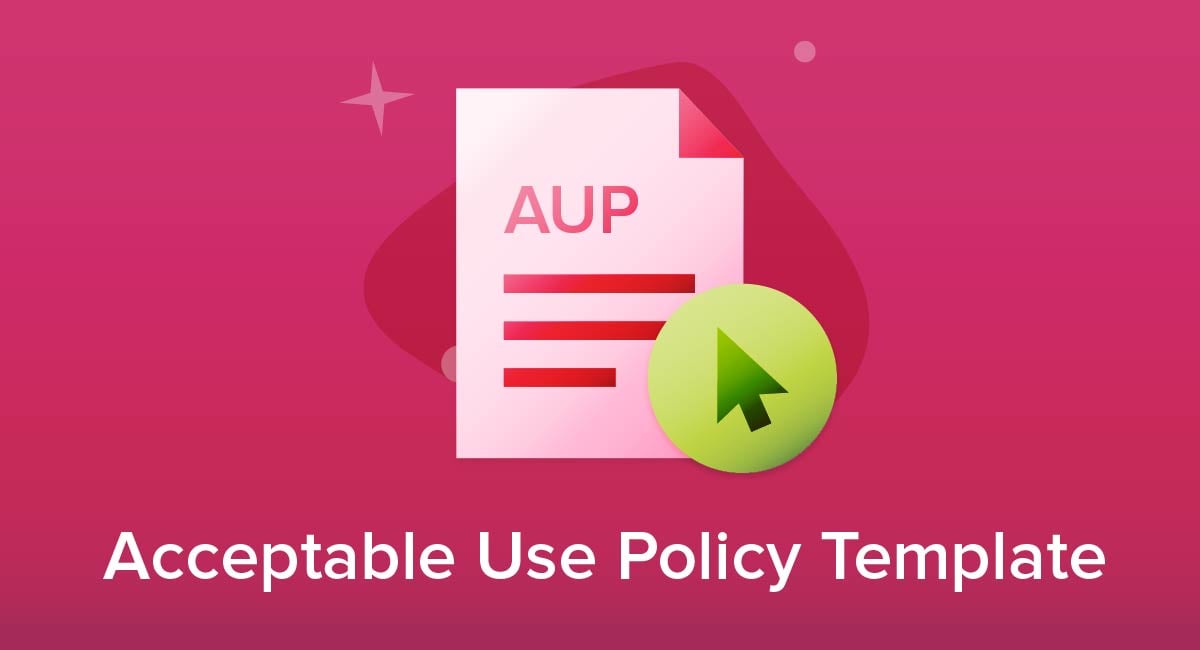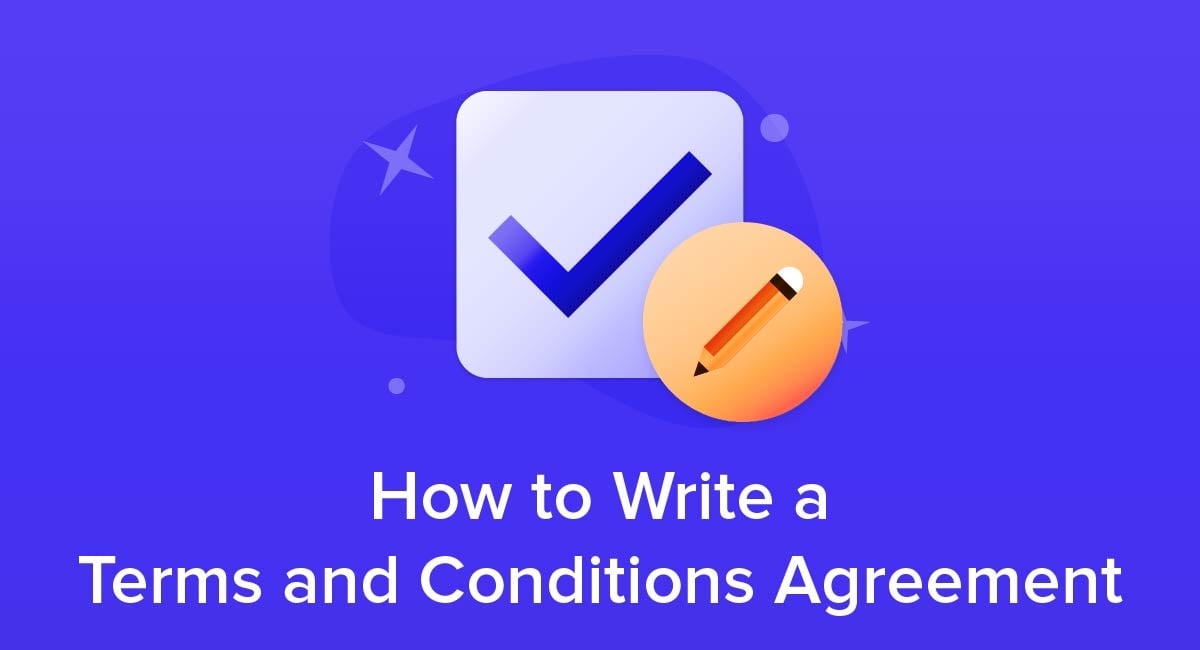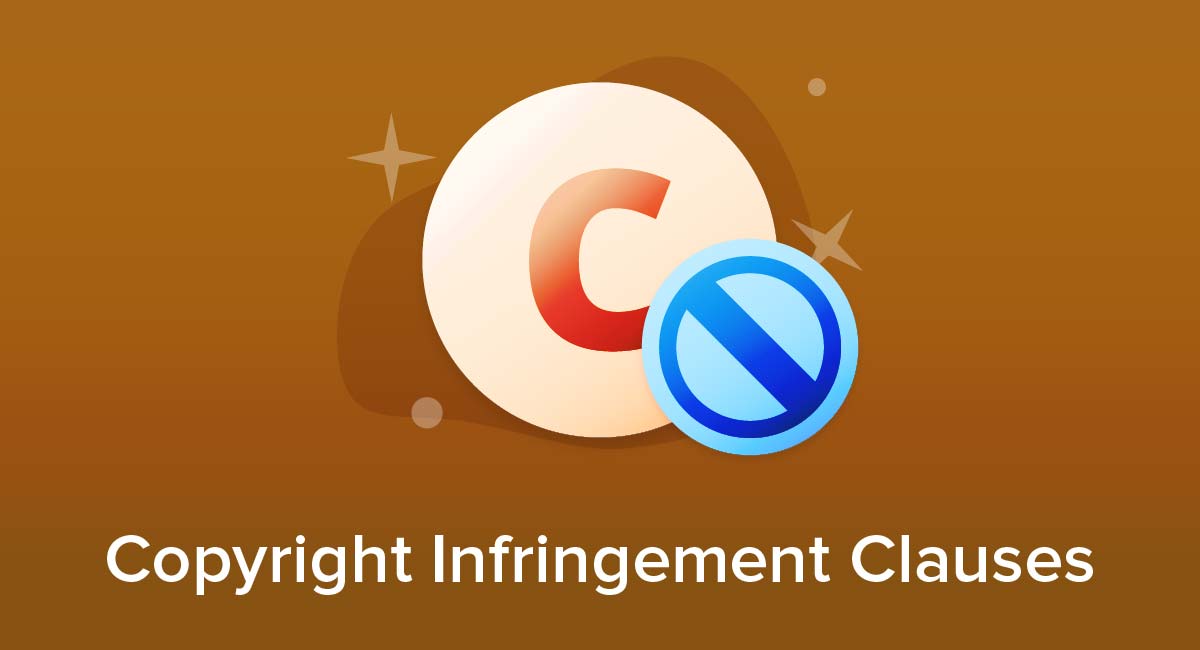
Whenever you publish content, copyright is a potential issue. Many businesses include copyright infringement clauses in a range of documents such as a Privacy Policy, a Terms of Use agreement and commercial contracts.
Such clauses aim to protect your rights, limit your liability, and make things clear for all concerned.
Here's what you need to know about these important clauses.
Use FreePrivacyPolicy.com to generate the necessary legal agreements for your website/app:
- Free Privacy Policy Generator
- Free Terms and Conditions Generator
- Free Cookies Policy Generator
- Free Disclaimer Generator
- Free EULA Generator
- Free Return & Refund Policy Generator
You check our Free Cookie Consent to start making your business legally compliant with the Cookies Directive in the EU.
What is Copyright?
Copyright is a legal right to ownership by writers and other creators. It isn't restricted to books, but covers any writing and media such as music and video. In simple terms, copyright covers any original form of expression.
Another way to understand copyright is to look at some of the things that it can't cover:
- An idea (which can't be protected in most jurisdictions)
- A short phrase or word used to identify or describe a business or product: This is protected by a trademark
- An invention or a way to do something: This is protected by a patent
Collectively, trademarks, patents and copyright are known as "intellectual property."
Do I Need to Register or Protect My Copyright?
While different jurisdictions have slightly different rules, the most common principle is that copyright exists automatically as soon as you create the work, for example by writing it down. You don't have to register it to enjoy legal protection.
However, some jurisdictions do have registration systems that offer some benefits.
For example, in the United States registering with the U.S. Copyright Office can mean you are entitled to statutory damages if you prove somebody infringed upon your copyright. These are additional amounts that go beyond compensation for the actual loss the infringement caused you.
What Do Copyright Infringement Clauses Do?

When you compare the wordings of different suggestions for a copyright infringement clause, you may be confused by the differences. That's because different clauses have different aims and apply to different situations where somebody holds copyright.
Most copyright infringement clauses will do the following:
- Establish and protect your copyright
- Clarify the legal position with original material posted by your users
- Detail how you handle allegations of copyright infringement by your users
- Detail how you handle the Digital Millennium Copyright Act
Establishing Your Own Copyright

Any content that you create and publish yourself, including on your website, enjoys copyright protection. Pointing this out to readers is not strictly necessary but can serve as a useful reminder to them and discourage infringement.
If anyone does infringe your copyright, for example by cutting and pasting text to use on their own site, or copying your images, you may need to take legal action.
Including a clause highlighting your copyright isn't legally required to take this action, but could mean you get a quicker resolution. It reduces the possibility of the user falsely claiming the material wasn't protected by copyright or that you had surrendered your rights.
Wellspect establishes its copyright and other intellectual property rights, and sets out how people can and can't use its material:
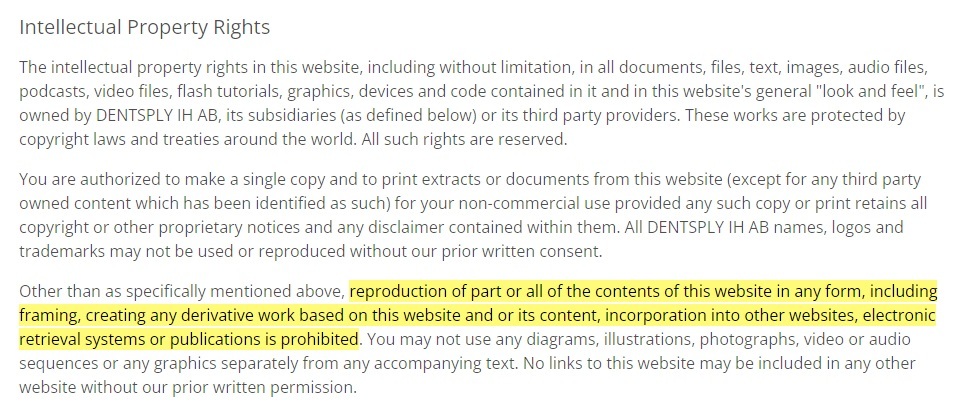
Visa gets straight to the point before going into fuller detail:
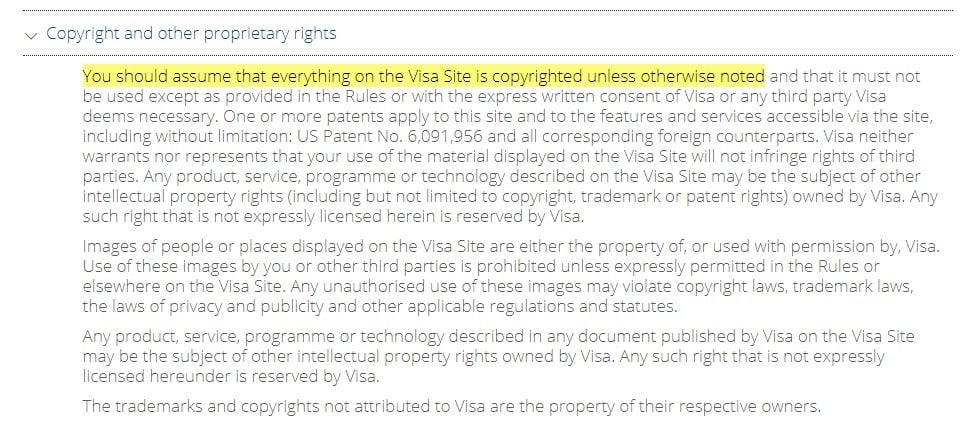
Let's look at how you should handle protecting other peoples' copyrights, in cases where you allow users to submit, share or repost content.
Your Users' Material

As with any original expressive material, content your users create themselves is protected by copyright. In most jurisdictions, a key principle is that copyright holders maintain that copyright unless they explicitly give it to somebody else.
When users of your site generate content, the usual principle is that they retain the copyright but give you a license to use it.
Though this is the default position, some sites find it useful to include a clause spelling this out. This helps you by removing any suggestion that you have breached your users' copyright.
It also helps users by reassuring them you are not claiming copyright on the material.
Instagram goes into a lot of legal detail but makes the key point clear in the heading:
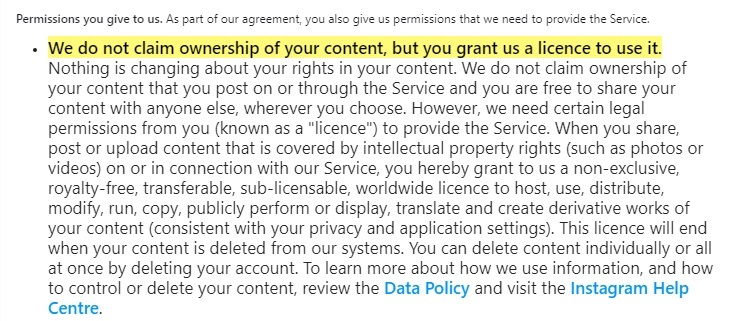
Facebook makes a similar point and gives specific examples:
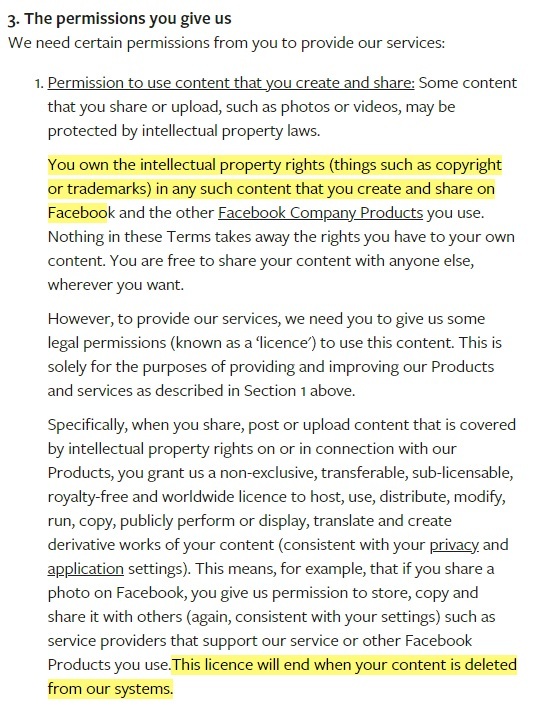
This type of clause content may not be needed if you don't deal with user-generated or submitted content. But if you do, it's very important to include it.
Copyright Infringement by Users

If you host material posted by users, you run the risk that it infringes the copyright of a third party. This could lead to the third party taking action against you as the "publisher."
One way to reduce (but not eliminate) this risk is with a liability clause. This usually has wording designed to achieve the following:
- To make it a condition of use that users only upload material to which they own the copyright. That is, original material they have created themselves.
- To make it clear that if users breach this condition, you have the right to delete the material and to suspend or cancel their use of the site. With paid services you should address whether or not they will receive any refund.
- To disclaim liability for any copyright infringement in material posted by users. Such disclaimers may be more effective if you make clear that you remove content as soon as you are aware that it infringes copyright. Such disclaimers may be less effective if you moderate user content before it appears on your site.
Sometimes this will work as a single clause while in other cases it may make more sense to put the information in different places. For example, the rules for users could be part of a dedicated Terms of Use agreement.
YouTube clearly states users cannot upload material whose copyright belongs to somebody else:
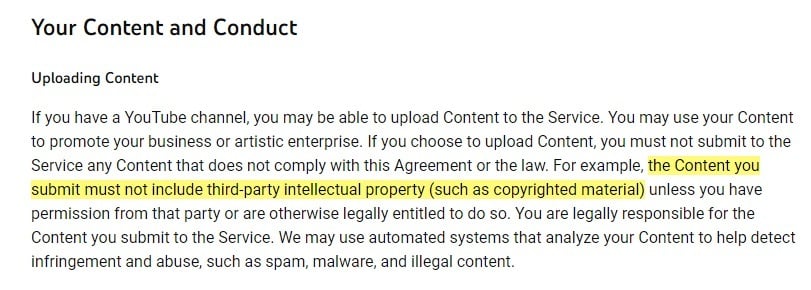
Blackboard is clear about its right to remove content:
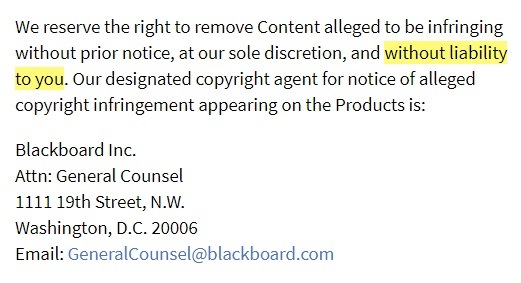
Because copyright laws in some jurisdictions limit such disclaimers and mean the website owners always bear some responsibility, such clauses often contain wording such as "disclaim liability to the fullest extent allowable by law." The theory behind this wording is that it reduces the risk of the entire disclaimer being declared void.
Digital Millennium Copyright Act (DMCA)

This law, which applies to U.S. businesses, updated copyright rules to cover a range of new technologies and situations. This included websites and online services that host content created by other people and the possibility that this material infringes the copyright of a third party.
The DMCA established a process by which third parties can demand the site or service take down the copyright-infringing material. The idea is that this can be a quicker and cheaper option than taking court action against the person who posted the material.
To make such a demand, the copyright holder must send a formal request (a takedown notice) in writing that:
- Identifies the copyrighted material,
- Gives the copyright holder's contact details, and
- Confirms they have not given permission for the copyrighted material to be used in this way
If the site or service complies with this takedown notice, they benefit from a "safe harbor" provision that means the copyright holder can't then take action against them for the infringement.
DMCA Clause
If you allow third parties to post material on your site or service, for example through a message board or user reviews section, a DMCA clause is extremely useful.
It serves two main purposes:
- To reassure copyright holders that you understand and comply with the DMCA takedown process and give the relevant contact details for filing a takedown notice.
- To make clear to users that you may take down the material they post if you receive a DMCA takedown notice. You can also make it a condition of using your site that people do not post copyright-infringing material. This can be useful if you offer a paid service and need to make clear that the DMCA process can limit customers' right to post material.
How much detail to go into may depend on the nature of your site or service. As a good rule of thumb, if third-party posting is only a small part of what you offer, a brief clause in your general terms of use should be enough.
If it is a major part, for example if your site is entirely made up of user-generated material, you may want to go into more detail and possibly have a separate page covering DMCA takedowns. This could detail exactly what information and in what format you require to treat a takedown notice as valid and take action.
Cognism clearly details the points a takedown notice must include:
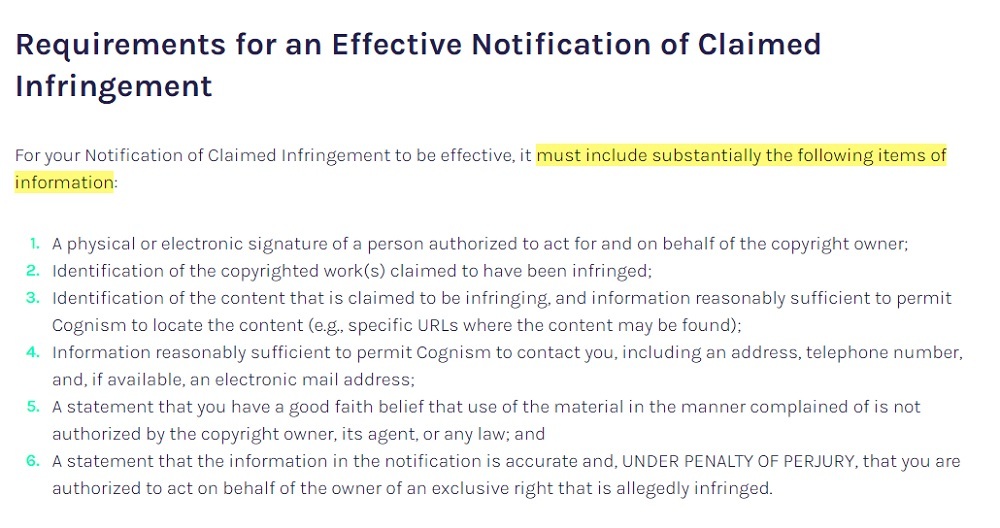
DMCA Counter-Notices
The DMCA says you must tell people when you comply with a takedown notice and remove their material. They then have the right to post a counter-notice asking you to restore the content. This counter-notice must be legally signed (meaning it can count as perjury if untrue) and say why the original takedown request is invalid.
When you receive a counter-notice you must inform the person who filed the takedown notice and restore the content within 14 days unless they sue the person who posted the material.
If you have posted a DMCA clause, you may want to add an extra clause telling people how they can file a counter-notice and what information to include.
Twitter details when a counter-notice may be appropriate:
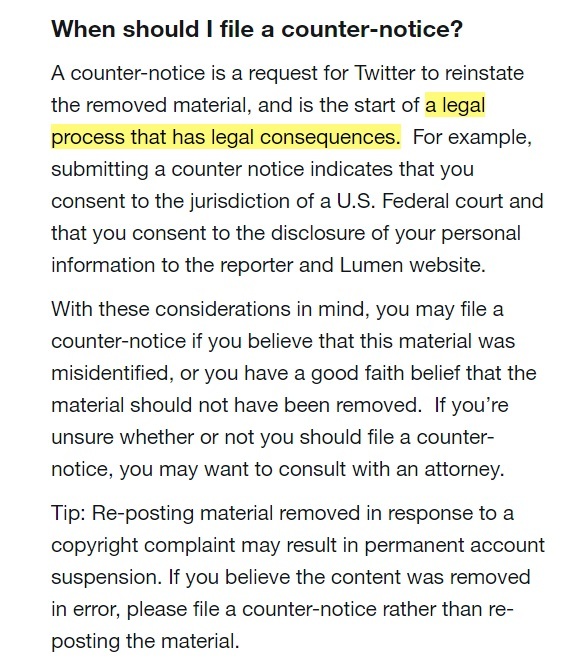
Summary
Let's recap what you need to know about copyright infringement clauses.
- Copyright protects original expression such as writing, images and video.
- Copyright normally applies as soon as you create the work without you needing to claim or register it. Some jurisdictions offer stronger protections and benefits if you register copyright.
- Copyright infringement clauses can clarify the legal position and protect your interests in a range of contexts.
- A clause establishing your content is rarely strictly necessary but can serve as a warning to potential infringers.
- If you host user-generated content, it's useful to have a clause that confirms they retain their copyright but give you permission to use the content.
-
If you host user-generated content, it could infringe the rights of third parties. You should have a clause that makes clear:
- Users are not allowed to upload content that infringes copyright and that you can and will remove it if they do
- As far as legally allowed, you disclaim responsibility for any such infringement
- The Digital Millennium Copyright Act applies in the US. It protects you against infringement by user-generated content as long as you take it down once you receive a valid takedown request from the copyright holder.
- A DMCA clause tells copyright holders how to file a takedown request and confirms you will take material down in such cases.
- The DMCA gives the alleged infringer the right to file a counter-notice disputing the copyright claim. You may want a clause that tells people how to file the counter-notice.
